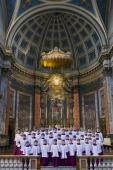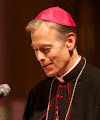 Charles Cole, appearing on Vatican Radio, describes Pope Benedict XVI’s contribution to sacred music and, in the audio interview, mentions CMAA as a resource for education in sacred music. (Thanks, Charles!)
Charles Cole, appearing on Vatican Radio, describes Pope Benedict XVI’s contribution to sacred music and, in the audio interview, mentions CMAA as a resource for education in sacred music. (Thanks, Charles!)
(Vatican Radio) Among the estimated 150 thousand people who spilled from St Peter’s Square out onto via della Conciliazione for Pope Benedict XVI’s last Angelus Sunday, were the burgundy blazers and caps of one of Britain’s most famous Catholic schools, represented by their equally world famous choir: The London Oratory Schola Cantorum.
“I offer a warm greeting to all the English-speaking visitors present for this Angelus prayer” said Pope Benedict, “especially the Schola Cantorum of the London Oratory School. I thank everyone for the many expressions of gratitude, affection and closeness in prayer which I have received in these days”.
The boys together with their director Charles Cole were fresh from singing at morning Mass in St Peter’s Basilica. They were invited by the regular choir for all non-papal liturgies in St Peter’s, the Capella Giulia, which is marking the 500th anniversary of its founding this year by inviting choirs from around the world to come and sing at the tomb of the Apostle.
At the end of Mass, to the joy of the congregation, both choirs, situated opposite each other in the two transepts of the Altar of the Chair, sung the sublime double-choir motet Adoramus te, Christe by the late renaissance Slovenian composer Jacob Handl.
It was just one of the many moving moments at St Peter’s this Sunday, but without doubt the excellence of the singing and the beauty of the liturgical music was of great spiritual benefit to the pilgrims who had flocked to Rome for this last appointment with Pope Benedict.
“I think the music of the Church has such an important role in developing and nourishing our faith and reinforcing things” says Charles Cole, Director of the London Oratory Schola Cantorum. He dropped by Vatican Radio to speak with Emer McCarthy about what he termed ‘musical evangelization’ and the great boost Benedict XVI’s pontificate has given to the current renaissance in Catholic liturgical music. Listen: CharlesColeOnVaticanRadio (17 min.)
“I think certainly in this day and age where frankly being a Catholic is very, very difficult when we have a constant stream from the media telling us that Catholic truths are off target and no longer in vogue, there are certain truths within the music that tells us, no we are not wrong, we are definitely doing the right thing and we need to keep at it”.
“I think the music is something very comforting, its our dialogue with God, it’s the way we relate to Him through the liturgy and for that to be something available to the boys through the choir is something of huge importance.”
“Under the pontificate of Benedict XVI there has been a particular focus on the relationship of the liturgy and music and this remarkable heritage and its grown to ever greater prominence. But it never really went away its always been there and its something that we simply need to keep alive and nurture, because frankly that music is so special, so unique for the Catholic Church…because its our music”.
“Music and the liturgy have been given a huge boost under his pontificate and that will last for a long time to come”.
 We are pleased to present to you an absolutely brilliant address by Archbishop Alexander Sample of Portland, Oregon, delivered at the CMAA colloquium, Salt Lake City, Utah, June 19, 2013
We are pleased to present to you an absolutely brilliant address by Archbishop Alexander Sample of Portland, Oregon, delivered at the CMAA colloquium, Salt Lake City, Utah, June 19, 2013